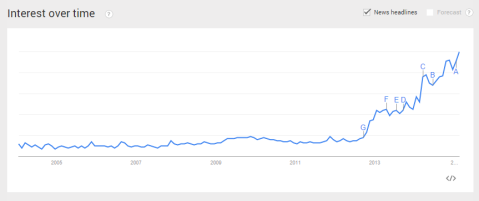One Year After Java 8’s Release, IDEs and Compilers are not Fully Ready Yet
One year ago, on March 18, 2014, Java SE 8 was released, and with it, the bliss of functional programming through lambda expressions and the streams API. These were great news for all of our Java ecosystem, and many people have already upgraded to Java 8. Stack Overflow already yields almost 2500 questions about Java 8 (with Brian Goetz himself answering). Also, Google Trends shows a massive increase in search volume

But even after one year, neither the javac compiler, nor the three major IDE compilers are fully Java 8 ready yet. This question by user meriton was asked on Stack Overflow, recently:
Lambda type inference infers an exception type not thrown by the lambda
The question shows the following piece of code:
class TestException extends Exception {
}
interface Task<E extends Exception> {
void call() throws E;
}
public class TaskPerformer {
private <E extends Exception> void perform(Task<E> task) throws E {
task.call();
}
public static void main(String[] args) {
// compilation error
new TaskPerformer().perform(() -> {
try {
throw new TestException();
} catch (TestException e) {
return;
}
});
}
}The false positive compilation error has probably been fixed with issue 429430. In any case, it is not reproducible with Eclipse 4.5.0 M5, available as a developer build
With Java 8, compiling Java code hasn’t really become any easier than before. The above bug has been produced by a very subtle combination of:
- Checked vs. unchecked exceptions
- Generics (and exceptions)
- Lambda expressions
- Type inference
- Flow analysis
If you’ve ever had a look at compiler source code, you cannot help but be glad that someone else is doing that job for you (the same is true when you look at jOOQ’s or Hibernate’s sources, by the way).
Where are we at with our compilers?
We’re getting there. My personal feeling is that early access releases of javac work best. For instance, I’m using
build 1.8.0_40-ea-b23
(disclaimer: this article was written before it was published. many problems are now gone with 1.8.0_40)
… although, you probably don’t want to go to production with such an early access release. IDEs building with javac, and Maven, of course, work equally well. Eclipse is lagging a little bit – which can be annoying at times.
Some of you non-Eclipse users might smirk and get your Eclipse vs. IntelliJ rants ready, and you know… there’s a saying about that:
A vegan, an IntelliJ user, a Mac user, and a Linux user walked into a bar.
How do I know?
AFTER 2 MINUTES, THE WHOLE DARN BAR KNEW!
(We actually have a whole article on that topic)
The fact is, all of the compiler teams are working hard to fix loads of bugs. IntelliJ, even while using javac to compile, may still display some false positives, visually in your IDE. Geertjan from NetBeans has just recently fixed a whole pile of bugs that we’ve reported. And Eclipse, well, Eclipse ships with their own very sophisticated incremental Java compiler. It’s a great compiler for rapid prototyping, but the drawback is that it compiles stuff slightly differently from others.
While developing jOOQ and also jOOλ, we’ve discovered quite a few bugs in Eclipse – many of them having been fixed already in Eclipse Mars. For instance:
- Wrong generic method type inferred from lambda expression
- Clicking F3 on a lambda arrow and Double Colon operator doesn’t work
- Lambda can be passed illegally to invisible method argument
- Excess semi-colon is inserted when auto-completing within a lambda expression
- Diamond operator prevents suggesting the creation of a new constructor
- Access to invisible members from within lambda expression produces misleading compilation error
- Bad compilation errors when lambda expression combines static method calls with boxing / unboxing and unary minus operator
- and many more…
We’re getting there. If you can, make use of lambdas and streams, and apply as much type inference in your code as possible. And please, if you do discover a bug, report it. We’re probably all using one of those three IDEs. Every bug that you report, is one less obstacle towards Java 8 adoption.
Here are the links to start registering bugs:
- Eclipse: https://bugs.eclipse.org/bugs
- IntelliJ: https://youtrack.jetbrains.com
- NetBeans: https://netbeans.org/bugzilla
| Reference: | One Year After Java 8’s Release, IDEs and Compilers are not Fully Ready Yet from our JCG partner Lukas Eder at the JAVA, SQL, AND JOOQ blog. |


